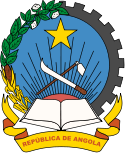
 Summary: This part looks at allegations that the former colony Angola is exporting corruption back to Portugal
Summary: This part looks at allegations that the former colony Angola is exporting corruption back to Portugal
THE EPO is about to sign some more papers with Angola (see part 1), one African country which both António Campinos and Benoît Battistelli are connected to (see part 2).
"Before we say more about the Angolan connection (to the EPO, Portugal and France) we wish to introduce readers to this background information."After it became independent in November 1975 the country was plagued by a long period of civil war which continued with some interludes until 2002. The civil war was essentially a power struggle between two former liberation movements, the People's Movement for the Liberation of Angola (MPLA) and the National Union for the Total Independence of Angola (UNITA). The conflict served as a surrogate battleground for the Cold War and it was characterised by large-scale direct and indirect international involvement by the Soviet Union and Cuba (on the side of the MPLA) and South Africa and the United States (on the side of UNITA).
As reported by the New York Times in June 2017, a reconstruction and oil boom following the civil war presented the politically-connected with a golden opportunity for self-enrichment. In an economy driven by President José Eduardo dos Santos (of the MPLA), his inner circle of family and allies have amassed extraordinary wealth. (c/f Angola’s Corrupt Building Boom: ‘Like Opening a Window and Throwing Out Money’)
In August 2017 the political situation in Angola got some coverage in the international media due to the elections being held there.
Transparency International took advantage of the occasion to issue a statement with the headline "Elections in Angola: time to tackle corruption".
According to Transparency International: "Corruption has for too long enriched a small ruling elite while more than two thirds of the country’s population live in poverty. Angola is the archetype of a captured state. It scores only 18 and ranks 164 out of 176 on the 2016 Transparency International Corruption Perceptions Index indicating rampant corruption."
The theme of corruption in Angola was explored further by the New York Times in an article with the headline "Portugal Dominated Angola for Centuries. Now the Roles Are Reversed" which was published shortly before the August elections.
"After it became independent in November 1975 the country was plagued by a long period of civil war which continued with some interludes until 2002."This New York Times article described how the former colony whose elite are being enriched by oil revenues is now exporting corruption back to the colonial motherland.
The article quotes Ana Gomes, a Member of the European Parliament from Portugal’s governing Socialist Party: "In Angola, they call Portugal the laundromat. It’s because it is."
According to the New York Times: "Angola is often listed as one of the world’s most corrupt nations. And Portugal has been singled out for its laxness in reining in money laundering and bribery, particularly in its dealings with Angolans, according to the Organization for Economic Cooperation and Development, the research and policy organization of the world’s richest countries."
Relations between Portugal and Angola have been strained recently by the indictment of Angola's Vice-President, Manuel Vicente, in February 2017. Vicente is a protégé and close associate of the controversial Angolan President José Eduardo Dos Santo who has ruled the country since 1979. Vicente first came to prominence following his appointment as CEO of Sonangol, the parastatal oil and gas company which has been used by Dos Santos over the decades to further his own political and business interests and those of his family.
Reports of interest:
"Relations between Portugal and Angola have been strained recently by the indictment of Angola's Vice-President..."In a separate development it was reported in July 2017 that three lawyers and four people including a former board member of the Portuguese national airline TAP had been charged with illegal activities related to an "Angolan money laundering scam" involving and Angolan company Sonair which is a subsidiary of Sonangol.
The National Airline in Portugal is accused of a corruption scheme with officials from Angolan Public Oil Company Sonangol. That was the headline of an article from this summer.
Top TAP director accused in Angola money laundering scam. That's another report from around the same time.
The current CEO of Sonangol is Ms. Isabel Dos Santos, daughter of the President, who was appointed to this position in 2016.
In 2012, Dos Santos was ranked by Forbes as one of "the five worst leaders in Africa".
"In a separate development it was reported in July 2017 that three lawyers and four people including a former board member of the Portuguese national airline TAP had been charged with illegal activities related to an "Angolan money laundering scam" involving and Angolan company Sonair which is a subsidiary of Sonangol."Forbes had this to say about Dos Santos: "To his discredit, José Eduardo has always run his government like it’s his personal, privately-owned investment holding company. His cousin serves as the Angola’s vice president, and his daughter, Isabel Dos Santos is arguably the wealthiest woman in the country."
The local media in Angola has described his presidency as "the epicentre of corruption". ⬆